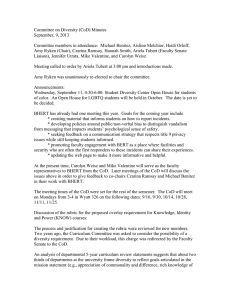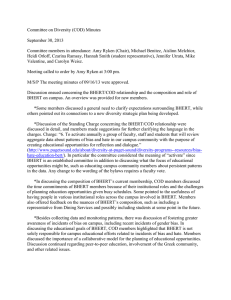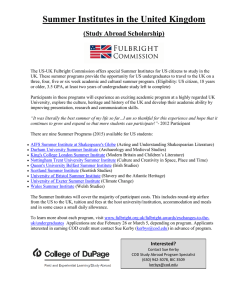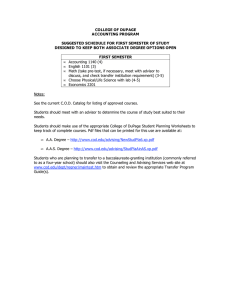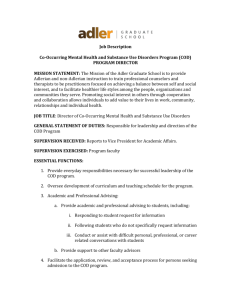Committee on Diversity (COD) Minutes October 28, 2013
advertisement
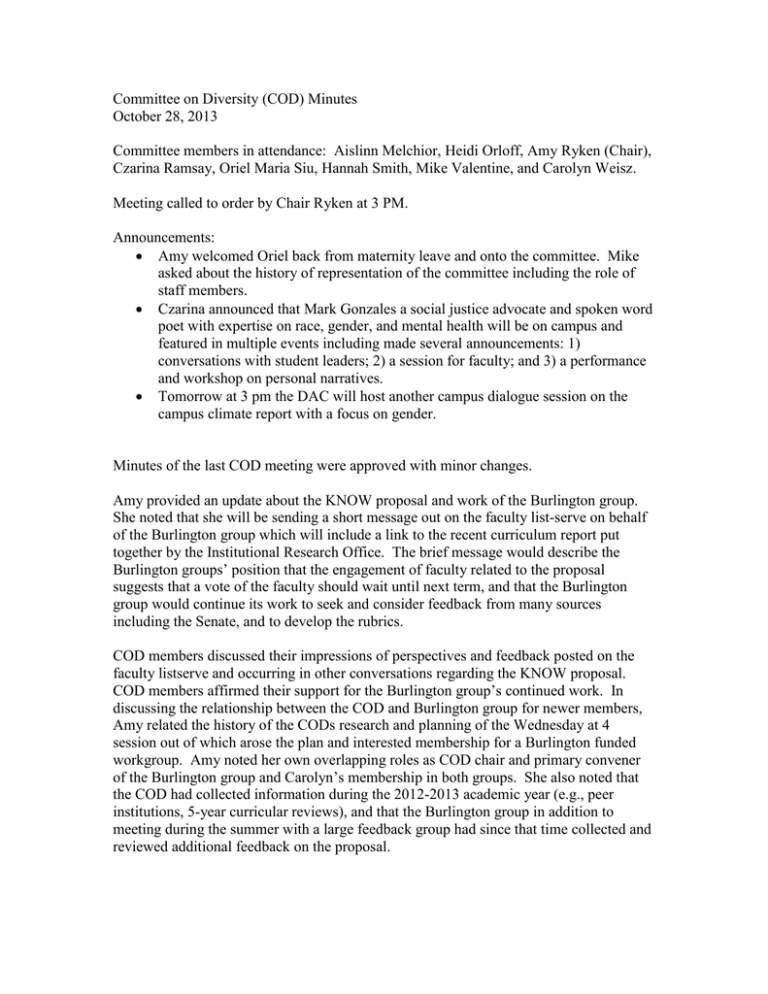
Committee on Diversity (COD) Minutes October 28, 2013 Committee members in attendance: Aislinn Melchior, Heidi Orloff, Amy Ryken (Chair), Czarina Ramsay, Oriel Maria Siu, Hannah Smith, Mike Valentine, and Carolyn Weisz. Meeting called to order by Chair Ryken at 3 PM. Announcements: Amy welcomed Oriel back from maternity leave and onto the committee. Mike asked about the history of representation of the committee including the role of staff members. Czarina announced that Mark Gonzales a social justice advocate and spoken word poet with expertise on race, gender, and mental health will be on campus and featured in multiple events including made several announcements: 1) conversations with student leaders; 2) a session for faculty; and 3) a performance and workshop on personal narratives. Tomorrow at 3 pm the DAC will host another campus dialogue session on the campus climate report with a focus on gender. Minutes of the last COD meeting were approved with minor changes. Amy provided an update about the KNOW proposal and work of the Burlington group. She noted that she will be sending a short message out on the faculty list-serve on behalf of the Burlington group which will include a link to the recent curriculum report put together by the Institutional Research Office. The brief message would describe the Burlington groups’ position that the engagement of faculty related to the proposal suggests that a vote of the faculty should wait until next term, and that the Burlington group would continue its work to seek and consider feedback from many sources including the Senate, and to develop the rubrics. COD members discussed their impressions of perspectives and feedback posted on the faculty listserve and occurring in other conversations regarding the KNOW proposal. COD members affirmed their support for the Burlington group’s continued work. In discussing the relationship between the COD and Burlington group for newer members, Amy related the history of the CODs research and planning of the Wednesday at 4 session out of which arose the plan and interested membership for a Burlington funded workgroup. Amy noted her own overlapping roles as COD chair and primary convener of the Burlington group and Carolyn’s membership in both groups. She also noted that the COD had collected information during the 2012-2013 academic year (e.g., peer institutions, 5-year curricular reviews), and that the Burlington group in addition to meeting during the summer with a large feedback group had since that time collected and reviewed additional feedback on the proposal. COD members discussed their sense of the campus and particular feedback they had received. There was agreement that there were a variety of positions and voices, and that the most public voices such as those on the faculty listserve might not be representative of the range and distribution of views of the faculty generally. Some COD members felt it was unclear which voices represented the majority or minority of the faculty, and some felt the majority of less public voices they had heard were supportive of the spirit of the proposal. Some COD members wondered why some faculty seemed to think that conversation about the draft of rubrics that had been circulated broadly for feedback was not allowed or welcomed, and signaled that the approved motion at the last faculty meeting to allow open discussion of the proposal should have addressed that source of confusion. They also noted a troubling degree of mistrust and suspicion conveyed in some of the feedback and language that incorrectly characterized faculty colleagues who had worked on the proposal as a homogenous or extreme group. Hannah added her perspective that student voices repeatedly indicated a desire for the proposed courses to include a connection to contemporary society so that students can learn how the issues of power and disparity affect their own lives. Committee members noted that a goal of the KNOW proposal is to prepare individuals for challenging conversations about diversity, inequity, and power, and that campus dialogue about the proposal itself indicates the need for these skills. One person said that faculty conversation about diversity should be a model, but that it seems to fall short. The importance of paying attention to how the dynamics of representation influence which voices are present and which are absent or silent was also raised. It was noted that some faculty seemed unaware of the reports available on Sound Net that described the work of the COD and the rationale for the KNOW proposal, and that some faculty have varying levels of expertise in considering different models of diversity pedagogy and curricula. The question of how the COD could help raise faculty awareness was raised. It was noted that additional information about students’ experience and perspectives regarding diversity in the curriculum was available in the recent curriculum report by the Institutional Research Office. COD members proposed that at the next faculty meeting Ellen Peters could present that information. Amy agreed to convey that request. The meeting adjourned at 4:05. Respectfully submitted, Carolyn Weisz
